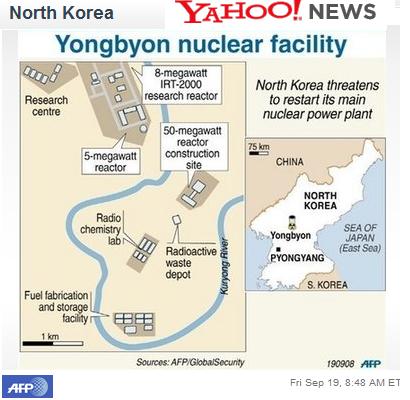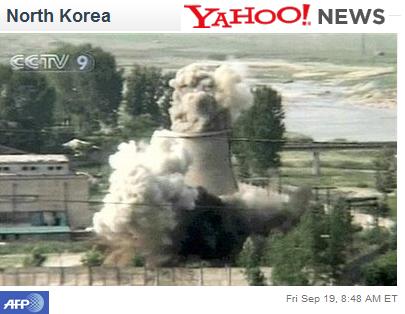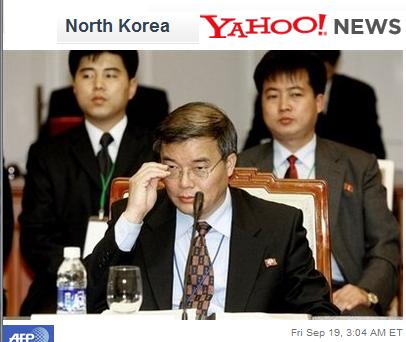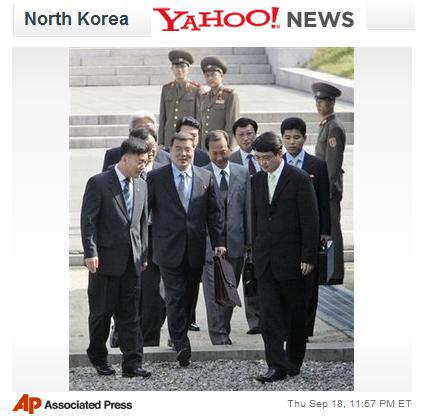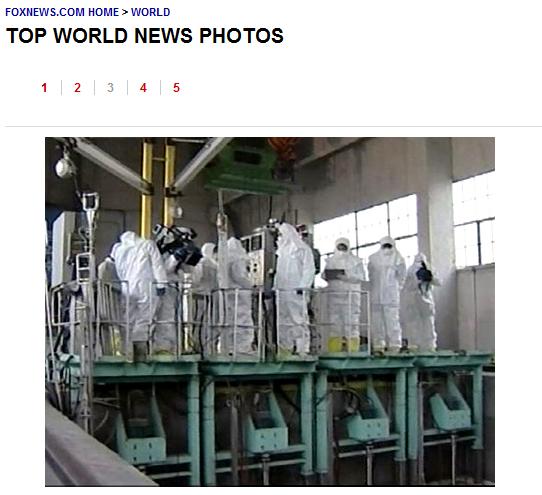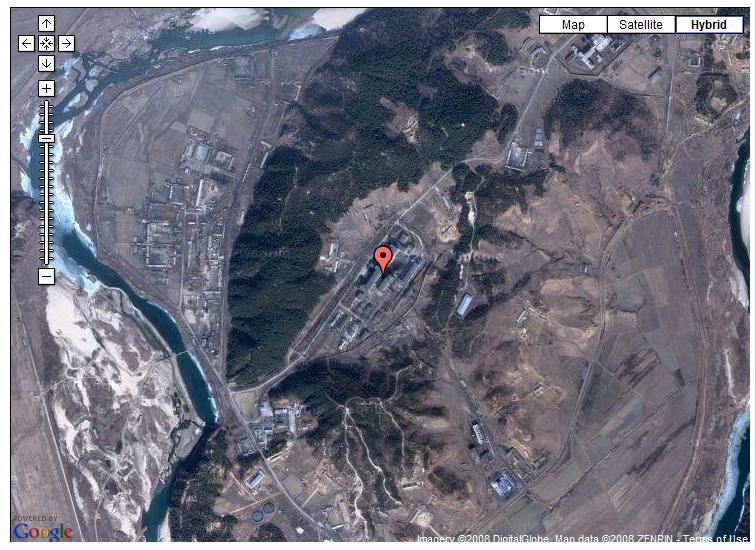NORTH
KOREA NUCLEAR CRISIS
BACK AGAIN
North Korea Leader Kim Jong il is ill
Now BACK TO NUK
The U.S. says the North first must
accept a plan to verify its
Nuclear Declaration.
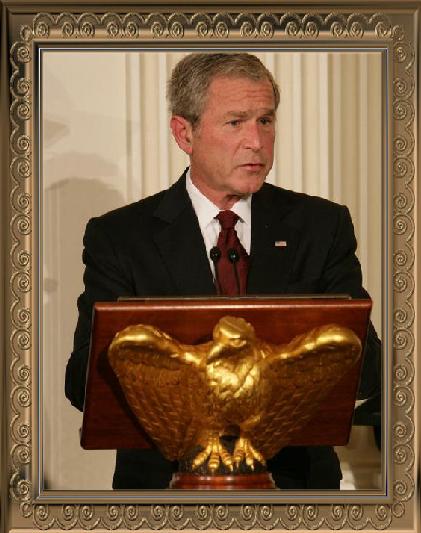
|
| Photo Description: President George W. Bush welcomes guests to the Iftaar Dinner with Ambassadors and Muslim leaders in the State Dining Room of the White House, Thursday, Sept. 17, 2008, to celebrate the traditions of Islamic faith and culture. White House photo by Chris Greenberg |
|
US
urges NKorea not to restart nuclear reactor
|
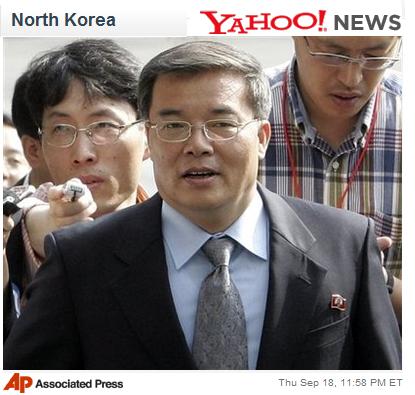 |
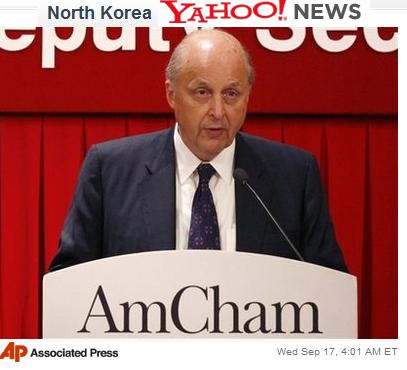
|
| North Korea's Deputy Director-General for Ministry of Foreign Affairs Hyun Hak Bong talks upon his arrival for meeting to work out details on further energy assistance to North Korea under a six-nation nuclear deal, at the border village of the Panmunjom, South Korea, Friday, Sept. 19, 2008. Hyun said North Korea is undertaking 'thorough preparations' to restart its nuclear reactor in Yongbyon. (AP Photo/Ahn Young-joon. Pool) | United States Deputy Secretary of State John Negroponte speaks during a luncheon in Hong Kong Wednesday, Sept. 17, 2008. Negroponte said the United States is still hopeful the North Korea would agree to a plan to verify its nuclear program declarations. (AP Photo/Vincent Yu) |
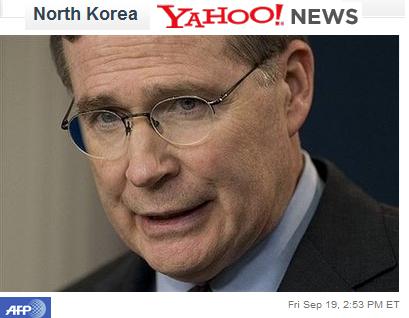 |
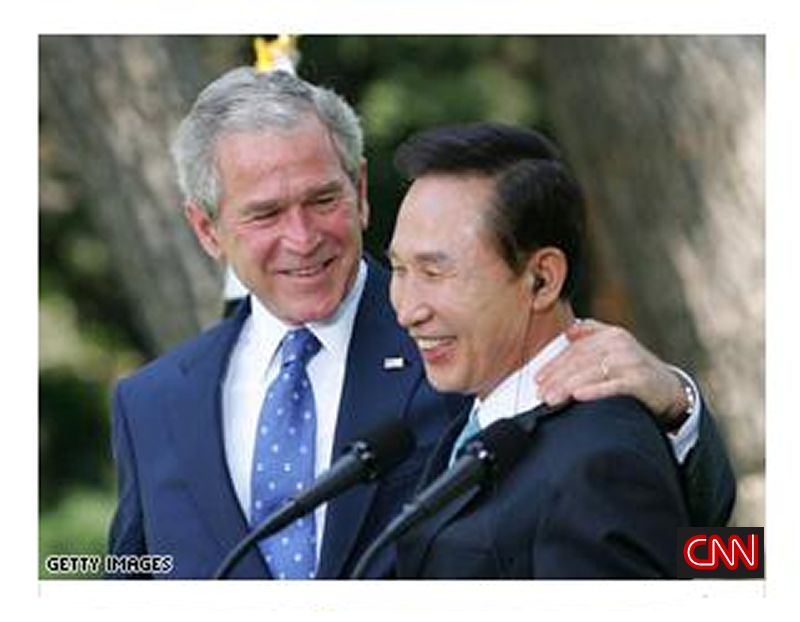 |
| National Security Advisor Stephen Hadley briefs the press on at the White House in Washington, DC in June 2008. North Korea is moving closer to restarting its nuclear reactor but the Bush administration is not about "to throw in the towel" on disarmament negotiations, the State Department said Friday. (AFP/File/Jim Watson). | President Bush spoke during a news conference with South Korean President Lee Myung-bak. The stop in South Korea is part of Bush's weeklong Asian tour. "Our relationship is important vital and I believe it is strong," Bush said. Bush said he was still concerned about North Korea and said the country has a long way to go before it is taken off his "axis of evil list" as well as removing it from a list of countries that sponsor terrorism. "I am concerned about North Korea's human rights record," Bush said "I am concerned about the uranium enrichment...". |
|
|||
|
Map
of North Korea's nuclear plant in Yongbyon. North Korea says it
is working to restart its atomic reactor and no longer wants US
concessions promised under the pact. North Korea has accused Washington
of breaking a nuclear disarmament deal. (AFP/Gil).
|
|
|||
|
North
Korea is preparing to restart its Yongbyon nuclear reactor amid
a deadlock in international disarmament talks, according to NKorea's
Deputy Director-General for Ministry of Foreign Affairs Hyon Hak-bong
(seen here in 2007). (AFP/Pool/File/Han Jae-Ho) |
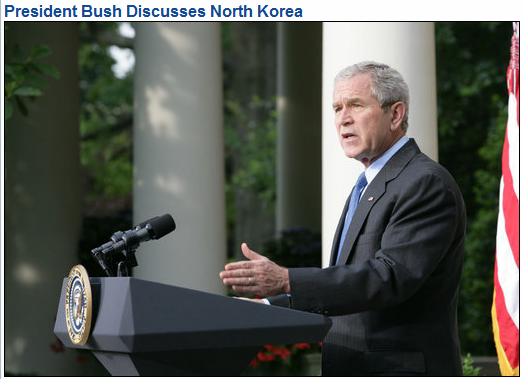 |
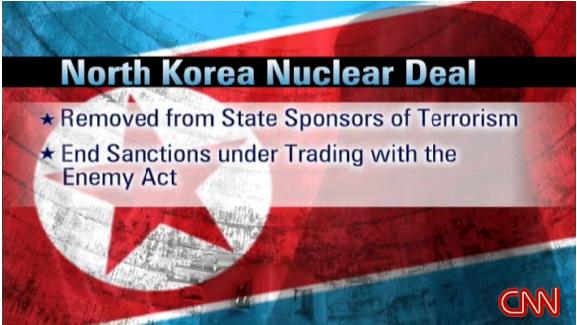 |
| President George W. Bush delivers a statement on North Korea Thursday, June 26, 2008, in the Rose Garden of the White House. Said the President, "The policy of the United States is a Korean Peninsula free of all nuclear weapons. This morning, we moved a step closer to that goal, when North Korean officials submitted a declaration of their nuclear programs to the Chinese government as part of the six-party talks." White House photo by Chris Greenberg | President George Bush will notifying Congress to rescind North Korea's designation as a state sponsor of terror in 45 days and will work through the six-party talks to develop a comprehensive and rigorous verification protocol. And during this period, the United States will carefully observe North Korea's actions -- and act accordingly. Photo Credit: CNN |
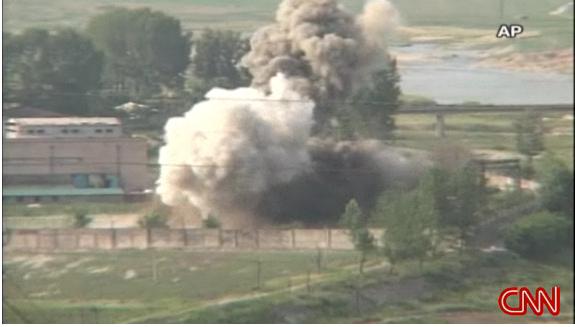 |
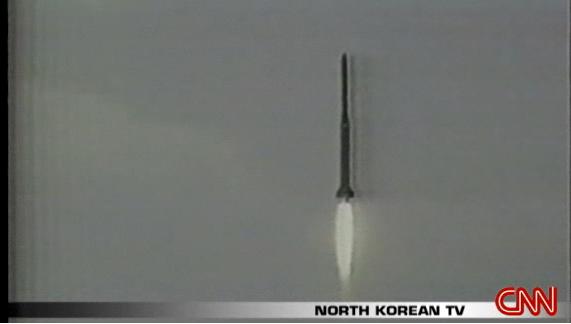 |
| June 27, 2008: Yong Byen Nuclear Reactor is now destroyed to exchange their Aid : Photo Credit: CNN | North Korea is No longer will be able to test the Nuclear test after more than 9 nuclear test. Photo Credit: CNN |
| Feb. 22: In this image from television, foreign reporters and workers in protective gear are seen at North Korea's main nuclear reactor in Yongbyon. North Korea opened its main nuclear reactor to foreign media for the first time Friday in a bid to show that it is complying with a disarmament accord to disable the facility. | Feb, 22: This facility and the surrounding nuclear industrial complex produces North Korea nuclear weapons. Six party talks designed to close this facility are ongoing. |
|
September
19th, 2008: It is the first time the communist nation has confirmed a reversal of steps taken since last year to disable its nuclear program because of Washington's refusal to quickly remove it from a U.S. terrorism blacklist. "We are making thorough preparations for restoration" of the Yongbyon nuclear complex, the deputy director-general of North Korea's Ministry of Foreign Affairs, Hyun Hak Bong, told reporters. He did not say when Yongbyon might begin operating again. Hyun spoke in the border village of Panmunjom before talks Friday with South Korean officials on sending energy aid to the North as part of the six-nation disarmament deal. The talks concluded late Friday afternoon. Under the landmark 2007 pact - involving the two Koreas, the U.S., China, Russia and Japan - North Korea pledged to disable its nuclear program as a step toward its eventual dismantlement in exchange for diplomatic concessions and energy aid equivalent to 1 million tons of oil. North Korea began disabling the Yongbyon complex last year, and the process was 90 percent complete, with eight of 11 key steps carried out "perfectly and flawlessly," Hyun said. In late June, North Korea submitted a long-delayed declaration of its nuclear activities and destroyed the cooling tower at Yongbyon in a show of its commitment to denuclearization. But the accord ran aground in mid-August when Washington refused to take North Korea off its list of states that sponsor terrorism, saying the North first must accept a plan to verify its nuclear declaration. North Korea responded by halting the disabling process and is now "proceeding with work to restore (Yongbyon) to its original status," Hyun said. The Foreign Ministry later issued a statement saying it no longer wanted to be taken off the U.S. terrorism list. "Now that the United States' true colors have been brought to light, (North Korea) no longer wishes to be delisted as a 'state sponsor of terrorism' - and does not expect such a thing to happen," said the statement, carried by the country's official news agency, KCNA. North Korea "will go its own way," it said. Hyun warned Washington not to press the verification issue, saying verification was never part of the disarmament deal. "The U.S. is insisting that we accept unilateral demands that had not been agreed upon. They want to go anywhere at any time to collect samples and carry out examinations with measuring equipment," he said. "That means they intend to force an inspection." He said forcing North Korea to comply with such an inspection would exacerbate tensions. The White House had no immediate reaction early Friday. South Korean and U.S. officials say it would take at least a year for North Korea to restart the reactor if it is completely disabled. South Korean officials urged the North during the talks at the border to resume disabling its nuclear facilities, saying energy aid is linked to that process, according to a South Korean official who spoke on condition of anonymity in line with government policy. Friday's talks - proposed by the North - indicate it does not want to completely scuttle the six-party negotiations, analysts said. "The North is sending a message that it wants to maintain the six-party talks," said Koh Yu-hwan, a North Korea expert at Seoul's Dongguk University. "The North also wants to get the remaining energy aid with winter drawing closer." Seoul's delegate at the talks, Hwang Joon-kook, assured North Korea that it would receive the remaining energy aid it was promised. But South Korea's foreign minister said North Korea's intentions remained unclear. "It's still uncertain whether the North's measures are aimed at reversing the whole situation to the pre-disablement level" or are a negotiating tactic, Yu Myung-hwan told reporters in Seoul. The tensions come amid reports that North Korean leader Kim Jong Il has suffered a stroke. Kim, 66, has not been seen in public for more than a month and has missed two major public events: a military parade marking North Korea's 60th birthday and the Korean Thanksgiving holiday. -------------------- When U.S. President George W. Bush Asia trip, he praised the U.S. relationship with South Korea on Wednesday and said the two nations should continue to work together to eliminate threats from North Korea. "Our relationship is important vital and I believe it is strong," Bush said. President Bush said he was still concerned about North Korea and said the country has a long way to go before it is taken off his "axis of evil list" as well as removing it from a list of countries that sponsor terrorism. "I am concerned about North Korea's human rights record," Bush said "I am concerned about the uranium enrichment..." . According to CNN, North Korea has started reassembling its main nuclear complex in retaliation for U.S. refusal to remove the Stalinist state from a list of states that sponsor terrorism, it was reported Wednesday. We think North Korea is taking these steps because it has not been removed from the terrorism list," he said Wednesday. North Korea announced last week that it had stopped disabling its nuclear plants on August 14 and would consider rebuilding its reactor because the United States has not removed it from a list of states that sponsor terrorism. U.S. State Department deputy spokesman Robert Wood said at the time that such a move would be "a step backward" and a violation of North Korea's commitments under a six-party deal involving the U.S., Russia, the two Koreas, China and Japan. MANY ARE SAYING, The North Korea STILL WOULD started reassembling its main nuclear complex in retaliation EVEN IF THE U.S. has removed the Stalinist state from a list of states that sponsor terrorism. MANY ARE WATCHING AND CONCERN AROUND THE WORLD, INCLUDE U.S. AND U.N. WHICH COMES THE CRITICAL AND DANGER AROUND THE WORLD. U.S AND THE GLOBAL SECURITY AND PROTECTION COMES FOR THE GOOD PURPOSE AND GOOD REASON.........AROUND THE WORLD PEACE. Source: CNN
New |
|
